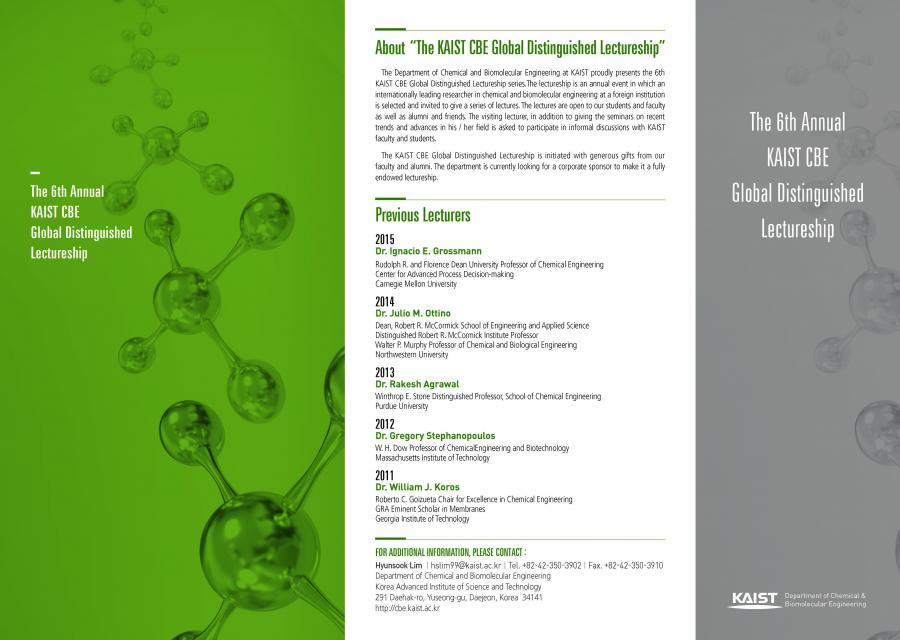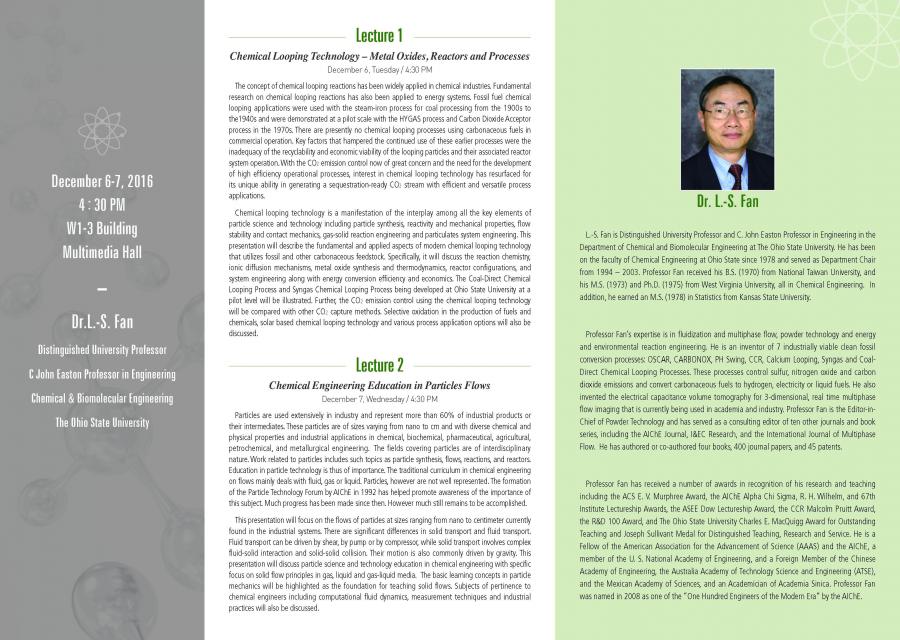- The 6th KAIST CBE Annual Global Distinguished Lectureship
- 관리자 |
- 2016-11-30 18:02:59|
- 13639
- 2016-11-30 18:02:59|


생명화학공학과에서 12월 6일(화), 7일(수) 이틀 간 “제6회 KAIST CBE Annual Global Distinguished Lectureship”을 개최하오니 많은 관심과 참여 부탁드립니다.
Please come and join "The 6th Annual KAIST CBE Global Distinguished Lectureship". Find the details below.
1. 장소: 응용공학동(W1-3) 1층 영상강의실
Place: W1-3 Building / Multimedia Hall
2. 강연자 Speaker: Dr. L.-S. Fan, Distinguished University Professor of the Ohio State University
3. 일시: 2016년 12월 6일(화), 7일(수) 오후 4:30
Date and Time: 4:30 PM, December 6 and 7, 2016 4:30
4. 강연정보 Lecture Details:
The 6th Annual KAIST CBE
Global Distinguished Lectureship
Department of Chemical & Biomolecular Engineering
KAIST
December 6-7, 2016 / 4:30 PM
W1-3 Building / Multimedia Hall
Dr. L.-S. Fan
Distinguished University Professor
C John Easton Professor in Engineering
Chemical & Biomolecular Engineering
The Ohio State University
Lecture 1
Chemical Looping Technology – Metal Oxides, Reactors and Processes
December 6, Tuesday / 4:30 PM
The concept of chemical looping reactions has been widely applied in chemical industries. Fundamental research on chemical looping reactions has also been applied to energy systems. Fossil fuel chemical looping applications were used with the steam-iron process for coal processing from the 1900s to the1940s and were demonstrated at a pilot scale with the HYGAS process and Carbon Dioxide Acceptor process in the 1970s. There are presently no chemical looping processes using carbonaceous fuels in commercial operation. Key factors that hampered the continued use of these earlier processes were the inadequacy of the recyclability and economic viability of the looping particles and their associated reactor system operation. With the CO2 emission control now of great concern and the need for the development of high efficiency operational processes, interest in chemical looping technology has resurfaced for its unique ability in generating a sequestration-ready CO2 stream with efficient and versatile process applications.
Chemical looping technology is a manifestation of the interplay among all the key elements of particle science and technology including particle synthesis, reactivity and mechanical properties, flow stability and contact mechanics, gas-solid reaction engineering and particulates system engineering. This presentation will describe the fundamental and applied aspects of modern chemical looping technology that utilizes fossil and other carbonaceous feedstock. Specifically, it will discuss the reaction chemistry, ionic diffusion mechanisms, metal oxide synthesis and thermodynamics, reactor configurations, and system engineering along with energy conversion efficiency and economics. The Coal-Direct Chemical Looping Process and Syngas Chemical Looping Process being developed at Ohio State University at a pilot level will be illustrated. Further, the CO2 emission control using the chemical looping technology will be compared with other CO2 capture methods. Selective oxidation in the production of fuels and chemicals, solar based chemical looping technology and various process application options will also be discussed.
Lecture 2
Chemical Engineering Education in Particles Flows
December 7, Wednesday / 4:30 PM
Particles are used extensively in industry and represent more than 60% of industrial products or their intermediates. These particles are of sizes varying from nano to cm and with diverse chemical and physical properties and industrial applications in chemical, biochemical, pharmaceutical, agricultural, petrochemical, and metallurgical engineering. The fields covering particles are of interdisciplinary nature. Work related to particles includes such topics as particle synthesis, flows, reactions, and reactors. Education in particle technology is thus of importance. The traditional curriculum in chemical engineering on flows mainly deals with fluid, gas or liquid. Particles, however are not well represented. The formation of the Particle Technology Forum by AIChE in 1992 has helped promote awareness of the importance of this subject. Much progress has been made since then. However much still remains to be accomplished.
This presentation will focus on the flows of particles at sizes ranging from nano to centimeter currently found in the industrial systems. There are significant differences in solid transport and fluid transport. Fluid transport can be driven by shear, by pump or by compressor, while solid transport involves complex fluid-solid interaction and solid-solid collision. Their motion is also commonly driven by gravity. This presentation will discuss particle science and technology education in chemical engineering with specific focus on solid flow principles in gas, liquid and gas-liquid media. The basic learning concepts in particle mechanics will be highlighted as the foundation for teaching solid flows. Subjects of pertinence to chemical engineers including computational fluid dynamics, measurement techniques and industrial practices will also be discussed.
* 본 강연은 영어로 진행됩니다. The Lecture will be conducted in English.
* 문의 Contact: 생명화학공학과 임현숙 Hyunsook Lim (T.3902, lhs99@kaist.ac.kr- 이전
- CBE BK 특별세미나 2017년 1월 13일
- 2016-12-12

